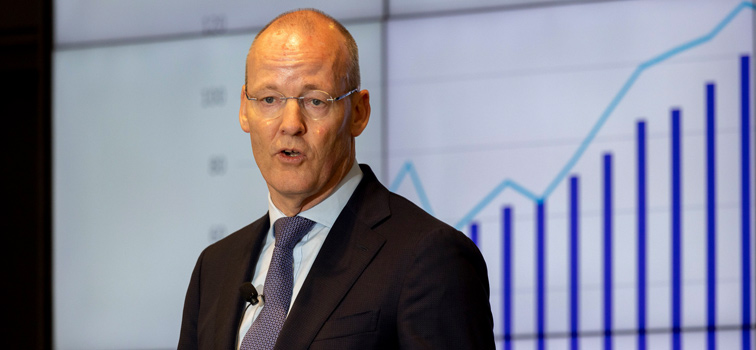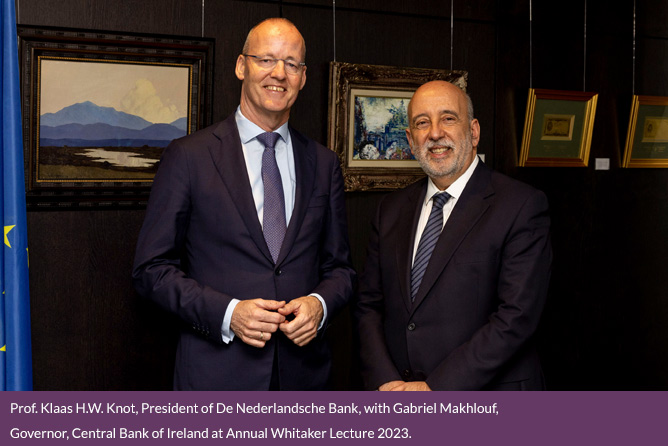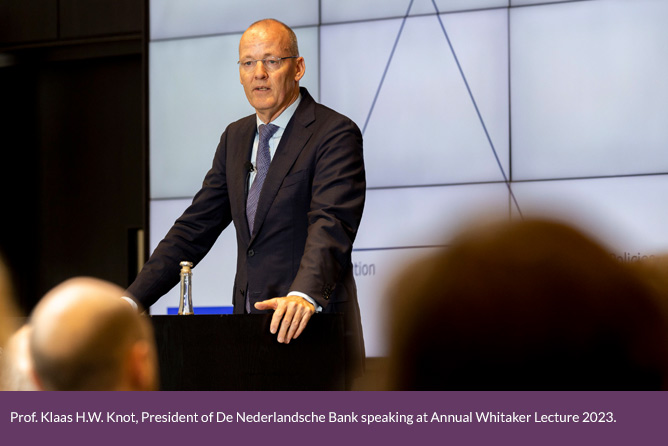Annual Whitaker Lecture – To maintain financial stability we do not only have to adapt to changing conditions, we also have to create the conditions to be able to adapt when stability is threatened.

To maintain financial stability we do not only have to adapt to changing conditions, we also have to create the conditions to be able to adapt when stability is threatened.
This was the view expressed by Prof. Klaas H.W. Knot, President of De Nederlandsche Bank, who delivered the tenth Whitaker Lecture at Central Bank of Ireland’s Dockland Campus on Wednesday, 19 April 2023.
The annual lecture, which returns after a three-year hiatus due to the pandemic, commemorates TK Whitaker, the influential economist and civil servant who served as Secretary of the Department of Finance from 1956 to 1969 and Governor of the Central Bank of Ireland from 1969 to 1976.
This year’s event also coincides with the 80th anniversary of the Central Bank which was founded in 1943.
The importance of an open economy
In his lecture entitled “Striving for financial stability” Prof. Knot said small economies like those of Ireland and the Netherlands need to be open to international trade and finance in order to create prosperity.
He said the importance of opening up the economy, and opting for internationalisation and integration, was understood by Whitaker who revived the fortunes of the Irish economy in the 1960s, at a time when Knot said “the economic weather was truly desperate”.
Knot said Whitaker’s “Programme for Economic Development”, which became the blueprint for Ireland’s transition in the 1960s, sowed the seeds for creating the “Celtic Tiger” by steering Ireland’s economy away from economic protectionism in favour of a strategy of encouraging foreign investment.
“Whitaker let the sun in by opening up the Irish economy to foreign investments and industrial development, including joining the EU, and ending its dependence on agriculture and tariffs,” said Knot.
“The weather improved dramatically, and by the end of his career, Ireland had an open and growing economy, based on foreign trade and investment, and was about to enjoy one of the most productive decades in its history.”
“Whitaker steered Ireland towards the warm economic climate that reared the Celtic Tiger and made it roar,” he added.
Vulnerable to economic shocks
Knot said that while for small countries like the Netherlands and Ireland having an open economy was “the only way to prosperity”, the cost was to be vulnerable to external financial stability shocks.
“For both our countries, openness is the only way to prosperity – as Governor Whitaker would probably remind us – so the only choice we have is accept the cost of being vulnerable to external shocks.”
“In opening up your economy, by opting for internationalisation and integration, you made a choice. A choice that affects the ability to regulate financial stability,” he said.
The crucial role of buffers
Knott said the trade-off between having an open economy and the ability to regulate financial stability, was why it is so important to have adequate financial buffers.
He said having such buffers in place was an important lesson learned from the Global Financial Crisis.
“The changes in sectoral regulations and supervisory standards have made our financial sector safer and better capitalised. The introduction of the macro-prudential framework strengthened its ability to absorb rather than amplify shocks,” he said.
He said the resolution process, developed since the financial crisis to deal with the problem of failing institutions, reduced the cost of winding them up.
And he said the robust capital position of the banking sector was part of the reason why a major economic shock such of the COVID pandemic had a limited overall impact on financial and economic stability.
“All these steps have made our financial sector and our economy more resilient to adverse economic shocks,” he said.
Common solutions to common challenges
Knott said small, open economies like Ireland and the Netherlands also need to work together to find common solutions to common challenges.
“We do not only need broad European and international cooperation, but also cooperation between our two countries, our two central banks, to find common solutions to increasingly common challenges,” he said.
He praised the Central Bank of Ireland for its work on developing a macro-prudential policy for the non-bank financial intermediation (NBFI) sector.
“I admire the role of the Central Bank of Ireland as a frontrunner in macro-prudential policy for the NBFI sector, as you first introduced a leverage limit for Irish property funds to address the risks stemming from excessive leverage and liquidity mismatch,” he said.
He also highlighted the importance of trust in central banks, citing examples of the recent failures of Silicon Valley Bank and Credit Suisse.
“Both of these events underline that trust is the most important asset that banks can have, the most important weight for balancing financial stability,” he said.
“Confidence and trust are the foundations of any well-functioning financial system, and we all know, or should know, that trust takes years to build, seconds to break and forever to fix.”
Prof. Knot concluded his lecture saying just as Ireland and the Netherlands have to manage unpredictable weather, we have to be ready for threats to financial stability which are also outside our control.
“When it comes to financial stability, nothing can be taken for granted. We cannot always predict the weather and we must live with the possibility of having four seasons in one day.”


See also: